Hydrogen fuel and vehicle stakeholders have fought back against claims that fuel cell electric vehicles aren’t a realistic UK zero-emissions alternative on the back of comments earlier this week.
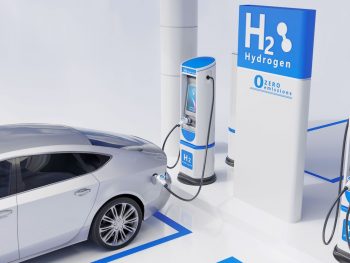
A press release published by the Association of Fleet Professionals (AFP) on Monday said that battery electric vehicles were the future and “hydrogen is simply not happening in any meaningful way and there is no real sign of that situation changing”.
It added that while the organisation was aware of a sizeable minority of fleet managers waiting to see whether hydrogen would become viable in the short-medium term, they were “probably set for disappointment”.
Paul Hollick, chair, opined: “The facts are that the hydrogen fuelling infrastructure barely exists, availability of vehicles is limited in the extreme and those that are available are very expensive. Apart from the introduction of one hydrogen van over the next year, we are seeing only minimal levels of investment in the fuel and certainly not on anything like the scale that would be required for widespread, rapid adoption.
“Elsewhere, such as in Germany, there is significant state support for the expansion of hydrogen but government commitment here is low. It is clear that as far as the vast majority of road transport is concerned, our politicians see electric as the future. Fleets waiting for hydrogen to emerge as a realistic alternative are almost certainty set for disappointment.”
The comments have left many in the hydrogen sector nonplussed. While the fuel is clearly very much in its infancy at present, the expectation is that it will play an increasing role as the infrastructure and vehicle choice – both cars and commercial vehicles – increase. And that hydrogen fuel cell electric vehicles (FCEVs) can provide a more convenient and practical alternative to battery electric vehicles (BEVs) due to longer ranges and faster refuelling times as well as onsite fuel generation. Hydrogen is also believed to be a particularly pertinent solution for heavier vehicles where BEVs present problems due to battery capacity issues and payload losses.
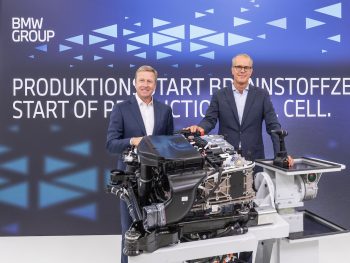
The Government has already stressed the importance of hydrogen in terms of energy security; its long-awaited hydrogen strategy published last year said the fuel is “essential to tackling climate change and reaching net zero”.
Its strategy will enable government plans to deliver 5GW of low-carbon hydrogen production capacity by 2030; both for powering homes and businesses but also transport. And it’s already announced investments into projects such as Whitelee Windfarm near Glasgow, which will use wind power to generate electricity for hydrogen production.
According to government analysis, up to a third of the UK’s energy consumption by 2050 could be hydrogen-based and hydrogen power is seen as critical to meet our targets of net zero emissions by 2050 and cutting emissions by 78% by 2035.
BMW – which is working on FCEV cars – has also said hydrogen is a versatile energy source that has a key role to play on the road to climate neutrality. And Fleet Assist, which is getting its network ‘hydrogen-ready’, has said it expects the interest in hydrogen to continue to increase and complement the growth of BEVs.
The view for many is that hydrogen can’t be ignored and provides a credible long-term pathway towards the full decarbonisation of the transport and road freight sectors, complementing battery electric vehicles.
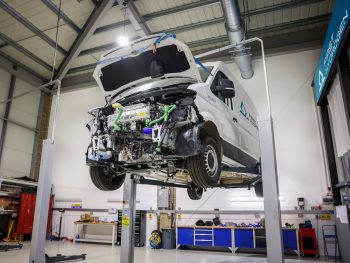
A future for sustainable mobility as a mixed market
Such a view is one that Allan Rushforth, chief commercial officer at automotive and energy company First Hydrogen subscribes to. The company, which has completed initial trials on its first demonstrator hydrogen-powered LCVs and starts major fleet testing in early 2023, is working to accelerate adoption of zero-emission vehicles in the light commercial vehicle market.
Rushforth explained: “We see the future for sustainable mobility as a mixed market where fuel cell electric vehicles and battery electric vehicles co-exist. FCEVs will have a greater presence in the commercial vehicle sector where range, speed of refuelling and payload in particular are key.”
And while current UK infrastructure for zero emissions vehicles is insufficient to meet the Government’s carbon ambitions, investment from public and private sectors is growing – First Hydrogen sees FCEVs being a suitable alternative to BEVs in the next five years.
Rushforth added: “The convergence of energy security and the war in Ukraine, vehicle emission targets and the forthcoming withdrawal of petrol and diesel engines for new vehicles are all fuelling the market.”
He also noted that although take-up of BEVs is rocketing among car and van buyers – SMMT CV stats for August show registrations of BEV vans soared by 14.7% to reach a 6.1% market share (from 4.0% a year ago) – it’s not all plain sailing for the sector.
Rushforth continued: “Challenges around electricity grid supply – Hillingdon, Ealing and Hounslow have had to pause housing construction until 2035 due to lack of available connections – could also hamper recharging capacity for BEVs. This is especially problematic for fleets that need overnight charging at depots for large numbers of vans. Resistance from the 70% of fleet drivers who ‘home park’ and are unable or unprepared to charge their vehicle at home will also make hydrogen an attractive alternative.
“We understand fleet operators may still be uncertain about adopting hydrogen, which is why, unlike other OEMs, we have developed a full Hydrogen-as-a-Service model. We will produce and provide vehicles, refuelling technology and a guaranteed supply of green hydrogen for the commercial transport sector. Within our vehicle road trials set to run early next year, 13 major fleet operators will test the vehicles to understand how the vans can meet operational requirements. They will also provide feedback on how we can ease the transition.”
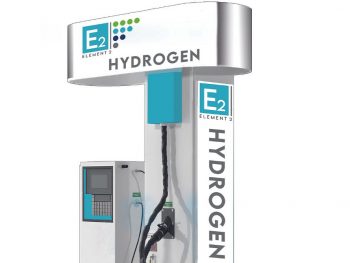
Tim Harper, CEO of Element 2, the organisation building the UK’s hydrogen refuelling network, concurred on the need for a tandem approach to FCEVs and BEVs.
“The businesses, fleet operators and manufacturers that we have spoken to know that we need both hydrogen and electric to decarbonise the transport industry,” he emphasised.
And while there is much ‘chicken and egg’ talk about hydrogen infrastructure, with only around a dozen stations around at present, the company stresses that the rollout is happening faster than many expect.
It’s pledged to have a UK-wide network of safe, high-quality hydrogen refuelling stations that will cover the entire country by 2027, “using green hydrogen from local and national producers to create the cornerstone for the decarbonisation of heavy transport”.
Element 2 has already signed a partnership with Exelby Services to develop hydrogen refuelling stations at its Coneygarth and Golden Fleece service station locations along the A1(M) and M6 motorways respectively. It’s also able to provide mobile hydrogen refueller to meet client demand for the low-carbon fuel.
Tim Harper added: “We met with Minister Trudy Harrison last week at the Tees Valley hydrogen hub where she could see hydrogen refuelling in action. With new sites already agreed on key transport corridors, UK-wide coverage is closer than you think. It is vital we all work together to achieve the UK’s zero carbon targets.”
An option for fleets wanting to make the switch
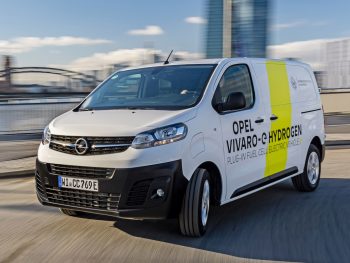
Global automaker Stellantis has also responded to the AFP announcement. Its Citroën, Peugeot and Opel brands have already developed hydrogen-powered vans for select markets in Europe and Opel’s UK counterpart Vauxhall has committed to launching its Vivaro-e Hydrogen alongside the existing battery-powered equivalent in early 2023.
Speaking to Fleet World, a spokesperson said: “Stellantis leads the electric van market in both Europe and the UK – our electric vans are already an option for fleets who want to make the switch today.
“Whilst it is clear that battery electric will be the dominant technology for most fleets for the foreseeable future, we have committed to developing hydrogen as an additional electrified choice for our van customers to fulfil demand from a number of fleets across Europe and UK who would welcome the combination of zero tailpipe emissions, a long range and rapid refuelling.”
Renault is also imminently launching a hydrogen-powered version of its Master van, dubbed the H2-Tech and providing a longer-range, zero-emission alternative to the battery-powered Master Z.E. It’s also working with Plug Power to offer an all-in-one refuelling solution to enable fleets to switch.
Meanwhile, the AA has said that while it’s investing in electric vehicles, it believes that there will be a role for hydrogen and possible synthetic fuels in the future, especially for business fleets.
And it’s already making its first forays into running hydrogen-powered vehicles on its own fleet. Its FCEV patrol car was revealed at the British Motor Show last month, based on a Hyundai Nexo SUV configured to operate as roadside breakdown vehicle.
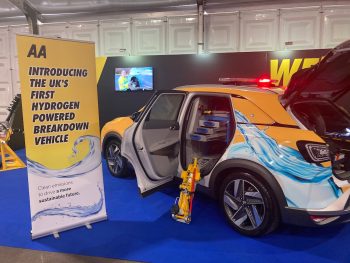
Designed for patrol work in Ultra Low Emission Zones, its 414-mile range makes it a “viable inclusion into the AA’s traditional yellow fleet, despite the UK’s general lack of hydrogen refuelling stations”, the organisation said.
With a higher range than EVs and a lower weight, due to the demands of EV battery size, hydrogen is becoming an increasingly attractive business option for commercial vehicles.
“The notion even six months to a year ago that we’d be able to operate a hydrogen-powered vehicle in our fleet would have seemed challenging, and yet now, we are able to integrate the Nexo into our fleet with a significant amount of repair capability at the roadside,” said Donald MacSporran, director, AA Vehicle Manufacturer Services.
“As technology moves on, and more vehicles use a hydrogen fuel system, this will allow us to expand the number of hydrogen vehicles in our fleet.
“Hydrogen vehicles have a significantly higher range than EVs, and also don’t need to be regularly recharged – a huge operational benefit for our patrol.”
Edmund King, AA president, added: “The discussions about carbon reduction and zero-emission vehicles have tended to concentrate on battery electric vehicles. But we want patrols to pilot this hydrogen fuel cell vehicle to see what lessons we can learn. We believe hydrogen might be used for our bigger tow trucks in the future.”
King added that the vehicle is another step towards the AA’s technological and Net Zero future.
“We hope to inspire some of our business customers to make the hydrogen switch too, as part of the alternatively fuelled journeys all operators and managers are currently embarking on,” he stated.

